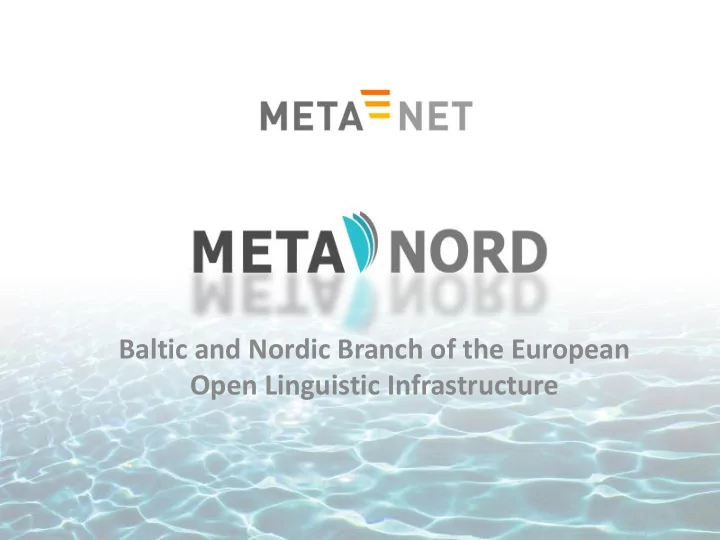

Baltic and Nordic Branch of the European Open Linguistic Infrastructure
Project Goal The META-NORD project aims to establish an open linguistic infrastructure in the Baltic (Estonia, Latvia and Lithuania) and Nordic countries (Denmark, Finland, Iceland, Norway and Sweden)
META-NORD Geography
Consortium Partner Country Tilde Latvia University of Copenhagen Denmark University of Tartu Estonia University of Bergen Norway University of Helsinki Finland University of Iceland Iceland Institute of Lithuanian Language Lithuania University of Gothenburg Sweden
Focus • Focus on European languages with less than 10 million speakers • EU official languages – Danish, Finnish, Swedish • Languages of the recently accessed EU countries – Estonian, Latvian and Lithuanian • Languages of the European Economic Area – Icelandic and Norwegian • For many META-NORD languages only limited high-quality language resources are currently available • Non-textual resources have been created only for some META-NORD languages
Main objectives • Describe the national landscape - language use, language-savvy products and services, language technologies and resources; main actors; public policies and programmes; prevailing standards and practices; main drivers and roadblocks • Collect resources in the Baltic and Nordic countries and document, link and upgrade them to agreed standards and guidelines • Collaborate with the META-NET network of excellence and other partner projects • Help build and operate broad, non-commercial, community-driven, inter-connected repositories , exchanges, and facilities • Mobilize national and regional actors , public bodies and funding agencies by raising awareness
Specific targets • Provide expertise to the META-NET in the fields where META- NORD partners have outstanding expertise: treebanks/syntax databases, terminology resources, wordnets and finite-state techniques • Develop and document methodologies for building language resources for under-resourced languages with focus on semi- automatic/machine assisted resource generation • Facilitate availability of BLARK resources for META-NORD languages • Facilitate knowledge transfer between CLARIN and META- NORD, especially on standards and intellectual property rights (IPR)
Target Language Resources • WordNets : monolingual WordNets and cross-linked pilots Danish, Estonian, Finnish and Icelandic • Treebanks : treebanks integrated on a uniform platform and linked across languages using parallel multilingual treebanking Danish, Estonian, Finnish, Icelandic and Norwegian • Terminology collections: distributed terminology resources across languages and domains will be consolidated META-NORD languages • Corpora Danish, Estonian, Finnish and Icelandic • Tools : Morphological analyzers, taggers, parsers Latvian, Lithuanian, Estonian, Finnish, Swedish • Lexicons : dictionaries, thesaurus Latvian, Lithuanian, Estonian, Swedish
Choosen approach Start WP2 Analysis and Selection of Language Resources WP5 Outreach, WP1 Management awareness and sustainability WP3 Enhancing Language WP4 Cross-national Resources collaboration and Pilot service End PERT Chart at a WP Level
Major Milestones May’11: National scene charts language community landscapes for the project languages Jul’11: Language resources charts available resources for the project languages Nov’11: Selection of resources methodology and criteria for the selection of resources, agreements and data Nov’11, Jul’12, Jan’13: Uploads of language resources Jan’13: Parallel treebanks Jan’13: Linked wordnets Feb’13: Multilingual terminology Jul’12: META-NORD national workshops
Key Mobilization Activities META-NORD national workshops Targeted meetings with the representatives of business and industry Joint activities with META-NET Network of Excellence Collaboration with other LT R&D projects Collaboration with CLARIN project Mobilisation of the research community – national, regional and international scientific conferences, forums and end-user and public events – showcase in educational scenarios – professional e-mail lists Enhancing awareness in society and government
Key results national scene charts describing language community and the role of language in the respective country, research community, language service and language technology industry, use of language technology by business and administration, legal provisions language resources charts of actually or potentially available resources to the META-NORD consortium treebanks for relevant languages accessible through a uniform web interface and state-of-the-art search tool and linked across languages using a parallel multilingual treebanking wordnets upgraded to agreed standards and used for creation of pilot multi-lingual lexicons for IR purposes using cross-language synset linking monolingual and bilingual terminology collections integrated into multilingual terminology bank with elaborated terminology data access and sharing mechanisms language resources batches upgraded to agreed standards, extended and linked across different sources, aligned across languages and populated into digital exchange platform for pilot operation
Expected results - usability • META-NORD specific types of language resources are prerequisites for future development of language technology products and multilingual services • Monolingual corpora are used for creation of language models of statistical MT systems • Many META-NORD languages are heavily inflected languages , it is difficult to retrieve sufficient information from raw text, and the existence of tagged and parsed corpora is a prerequisite for MT • Monolingual analyzers are used in rule-based as well as statistical MT systems
META-NORD The work within the project META-NORD has received funding from the ICT Policy Support Programme as part of the Competitiveness and Innovation Framework Programme Grant agreement no 270899 Project duration: February 2011 – January 2013 Contact information: Andrejs Vasiļjevs Andrejs[at]tilde.lv Tilde, Vienibas gatve 75a, Riga LV1004, Latvia
Recommend
More recommend